Day 5 – Travel to Korcula and Experiencing The Heritage Hotel (Tuesday April 1)
After an unforgettable stay in Split, I set off on the next chapter of my Croatian adventure—an island escape to Korčula. The journey began with a bit of drama, as I narrowly made my ferry thanks to a heroic taxi driver who expertly navigated the morning traffic maze.
With “Dancing Queen” by ABBA setting the tone aboard the boat, I arrived on the picturesque island ready to slow down and soak in its charm. My first impression? Absolute magic. The Aminess Korčula Heritage Hotel staff greeted me like royalty, and I was instantly swept up in the elegance, history, and warm hospitality of this coastal gem—once graced by the likes of Jackie Kennedy and David Bowie. Day 5 turned into a perfectly balanced mix of relaxation, indulgent food, local discoveries, and the kind of island charm that makes you never want to leave.
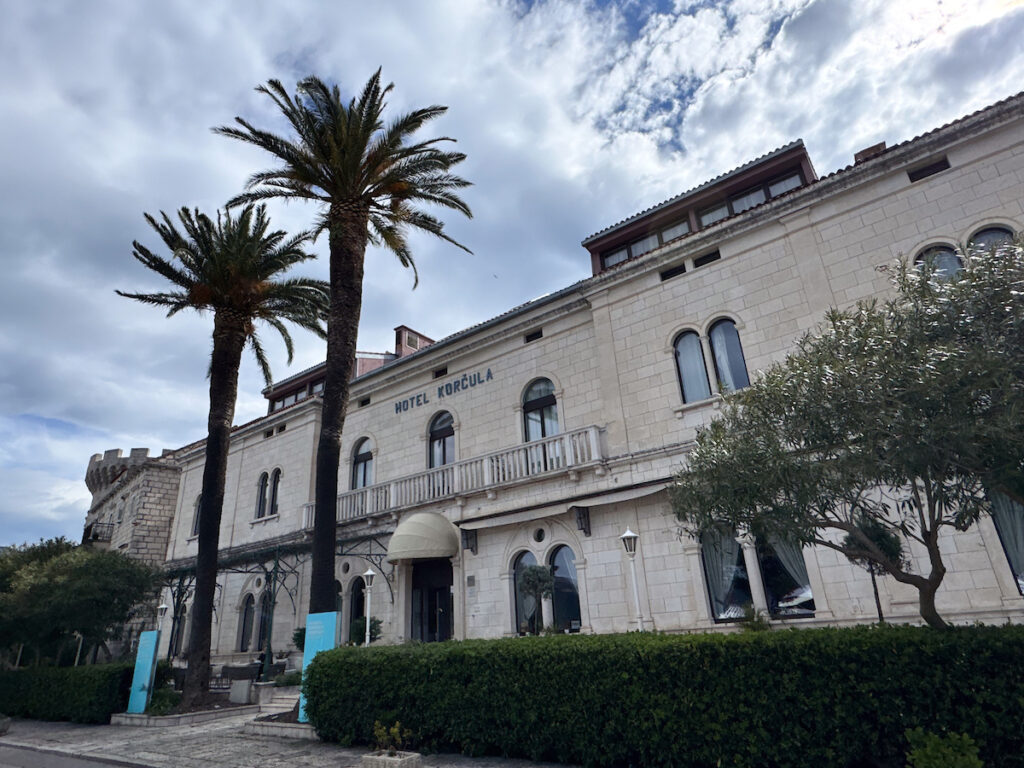
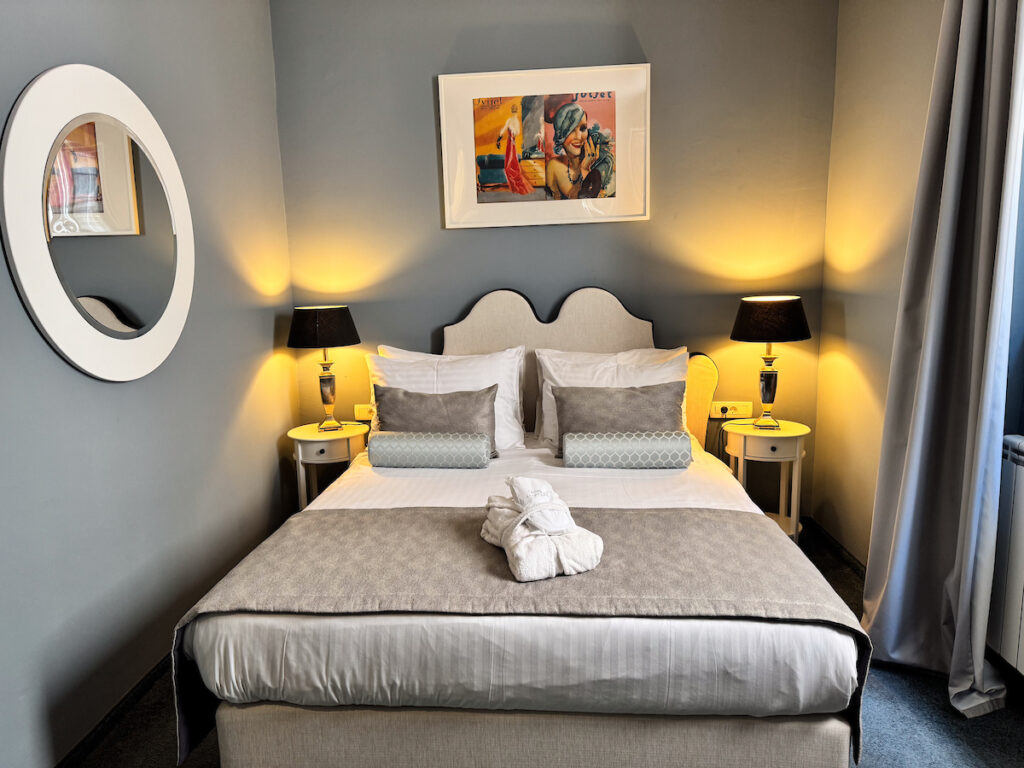
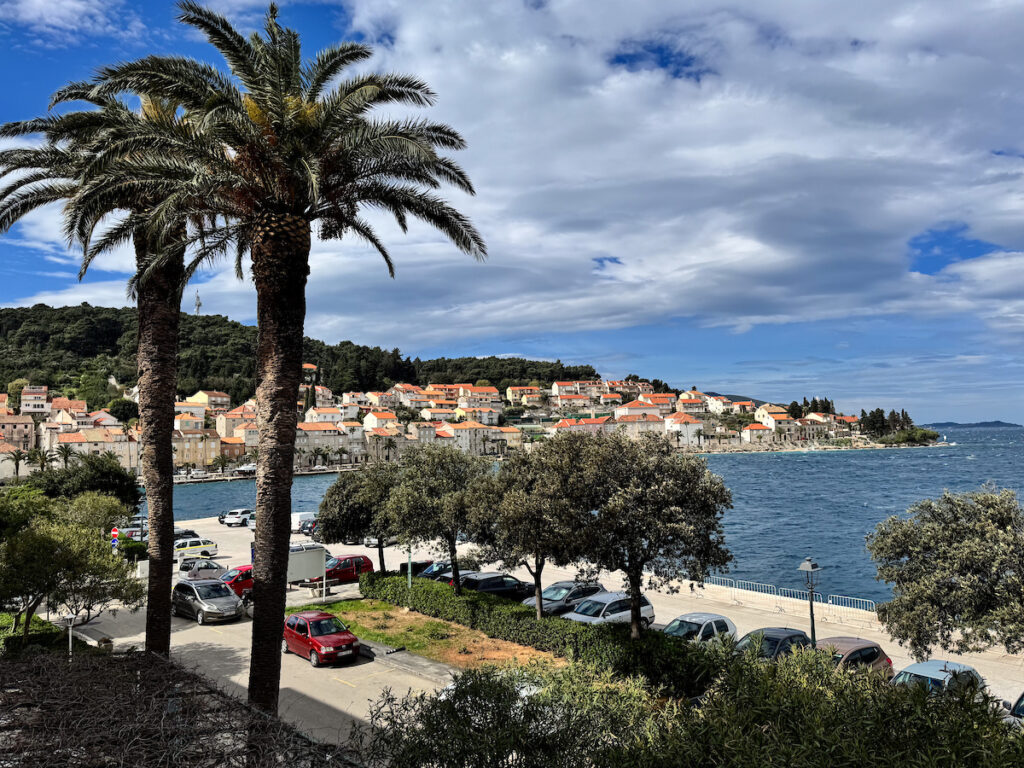
For lunch I went to a spot recommended to me by Monika, who I met at the Split Wine Festival. It’s called Bazita and has only been open for a month. Don’t let it being inside a shopping mall fool you, it has the coolest vibes, city views and delicious comfort food. I tried all my favorite American classics like fried cheese, pasta carbonara, and fries with cheese and bacon. At the end of the meal, the owner sent me an iced tea that had mint, strawberry and sugar. It was to die for!
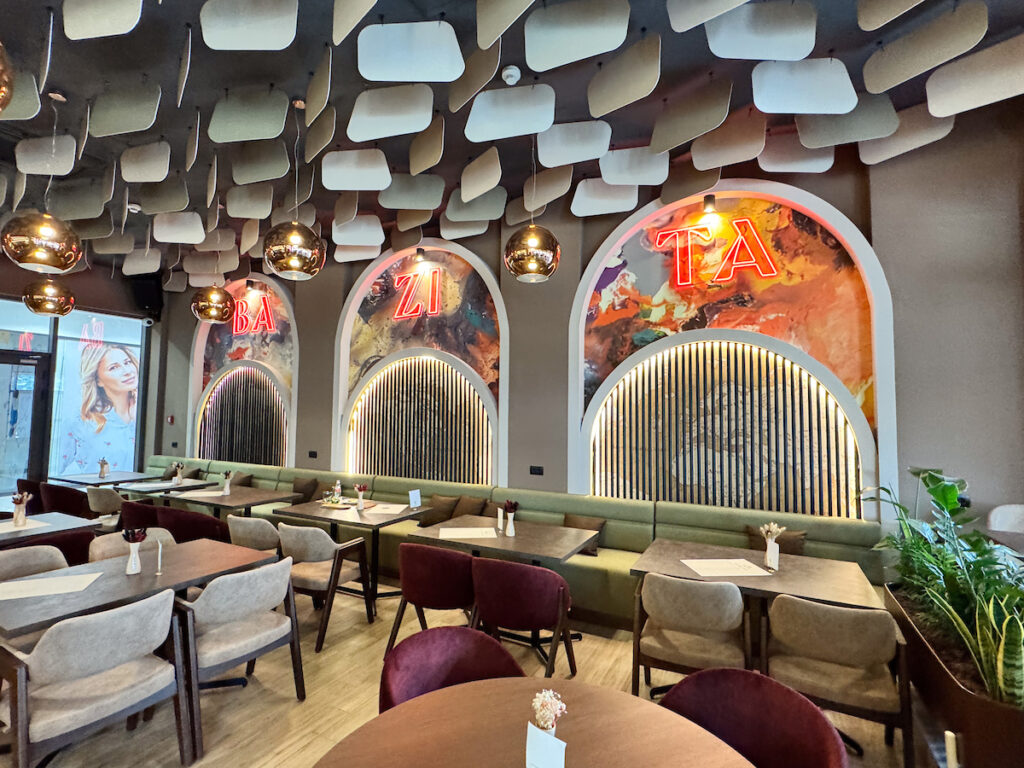
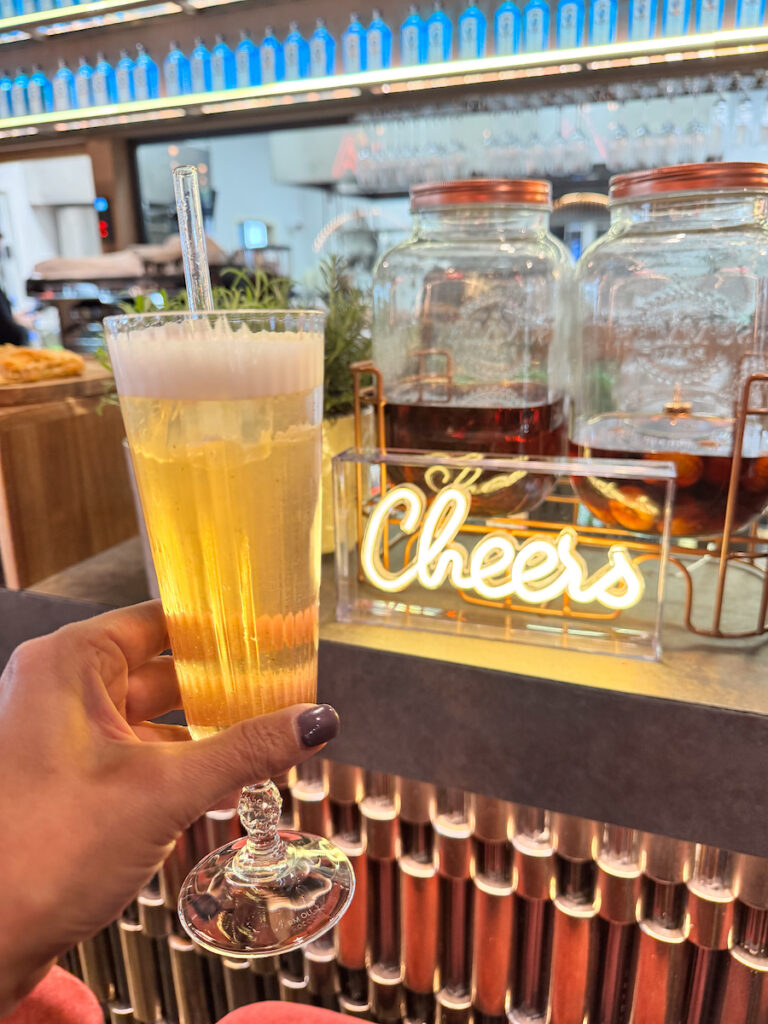
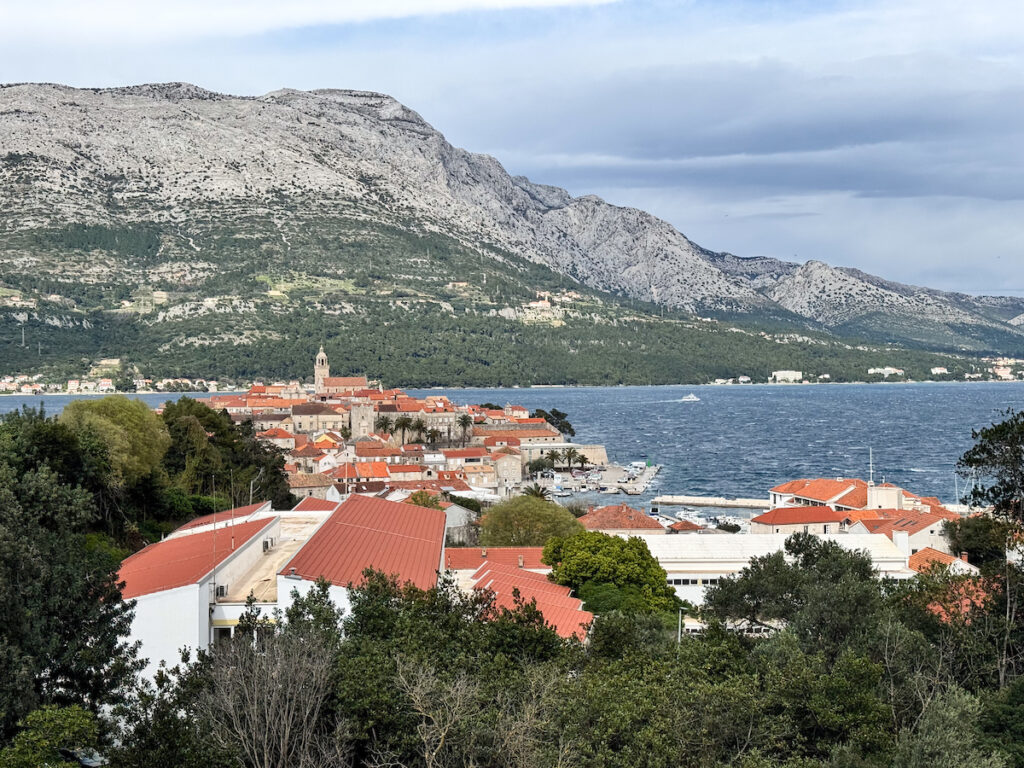
After lunch, I walked around the old city. I went into the beautiful St. Mark’s Cathedral and loved that I could see water at the end of every beautiful stone alley. Still a bit tired from the weekend, I decided to head back to the Heritage and watch the old Anthony Bourdain No Reservations episode on Croatia. I have never felt closer to him as I watched him fall out of the chair due to overconsumption of Croatian wine.
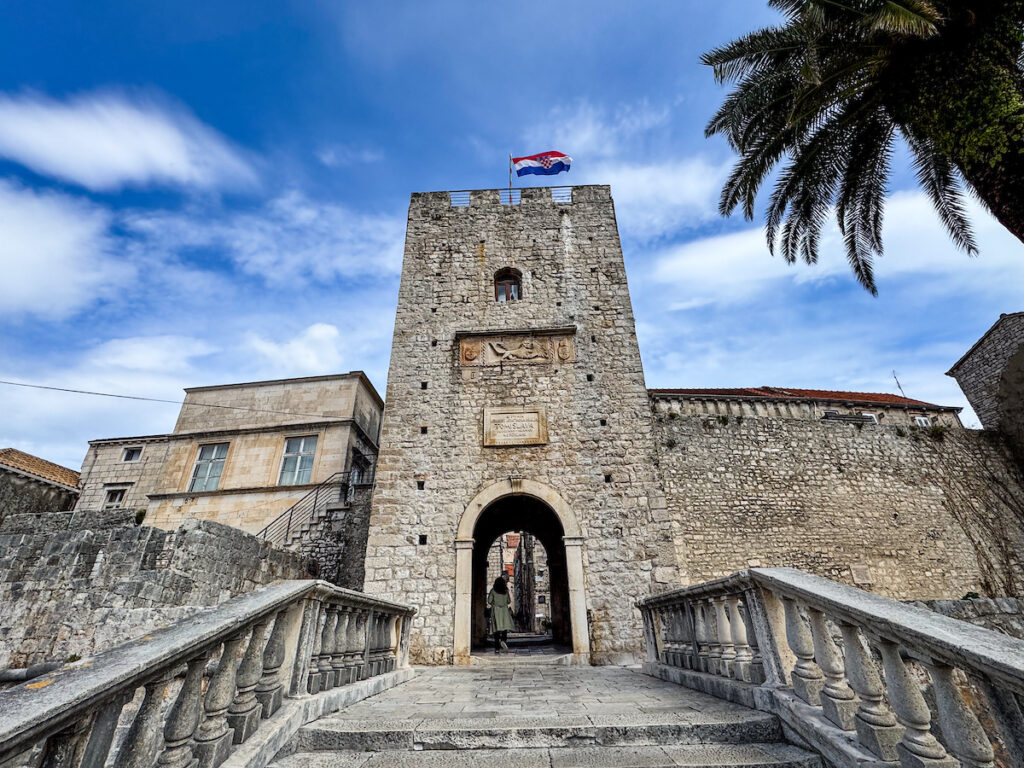
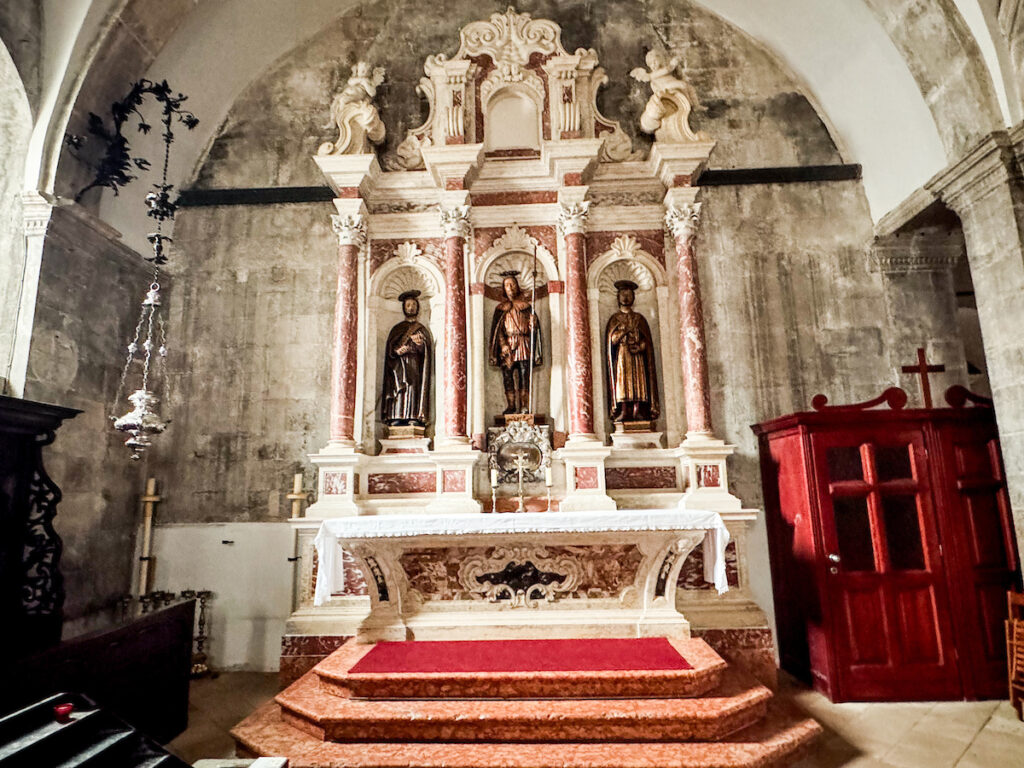
For dinner, I went to 7 Seas, the restaurant at the hotel, to enjoy the local cuisine. I dined on local prosciutto with cheese and chutney. After the charcuterie, I went for the sea bass, which was so good I even ate leeks. Dessert was a light and lovely lemon and walnut creation. They offered me local wines and seemed devastated when I said I didn’t want any because it is so special and only available on the island. I had to show them photos of that sheer amount of wine I had been drinking earlier to prove that I was ok.
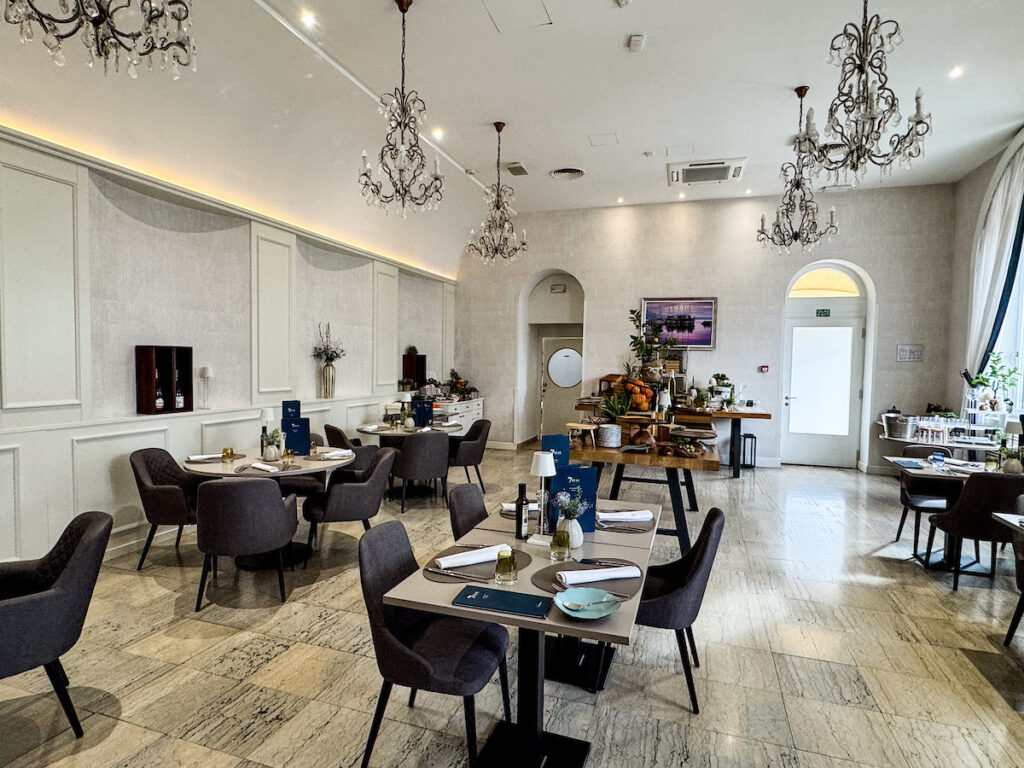
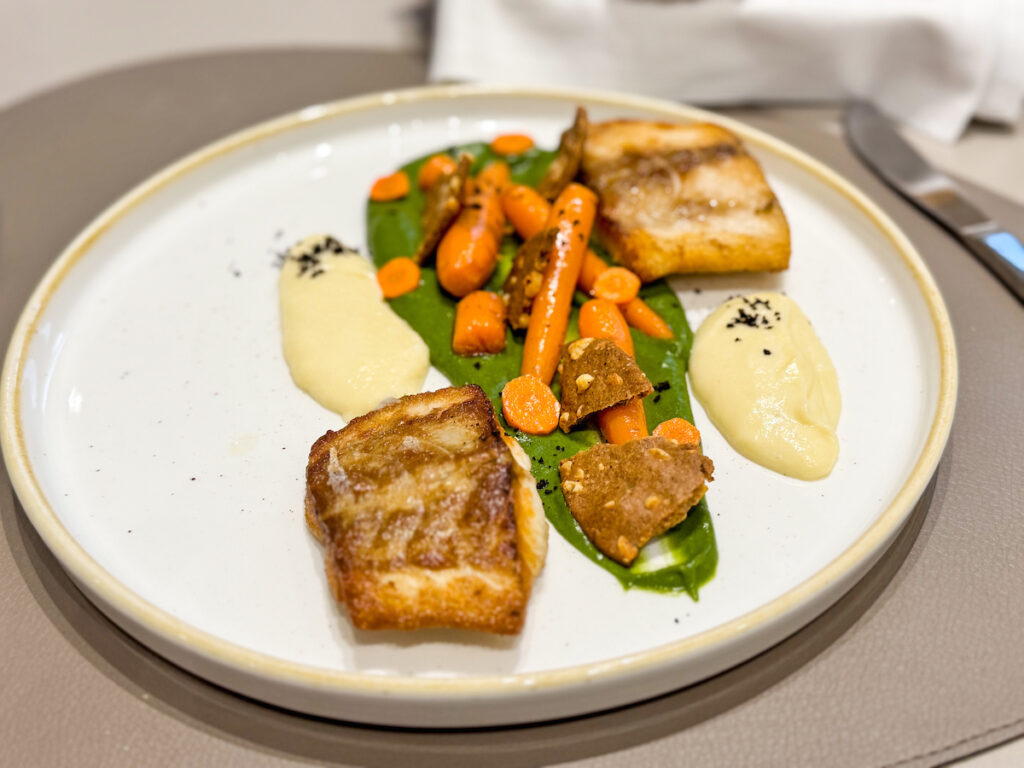
All in all, despite a stressful start, I had a lovely, relaxing day on the island.
Day 6 – Exploring Vela Luka and Blato City (Wednesday April 2)
So today was adventurous. I went to a cave. And I had more wine tasting. And cheese, and candied lemon peel, and olive oil and – the list goes on and on. I might be moving to Croatia, specifically Sanja Protić’s house.
First, I was driven about an hour out from Korcula city (the main city on the island) to a little port town called Vela Luka, known for its olive oil production. They have olive varieties I’d never heard of before and an EU original label with a special blend of olives.
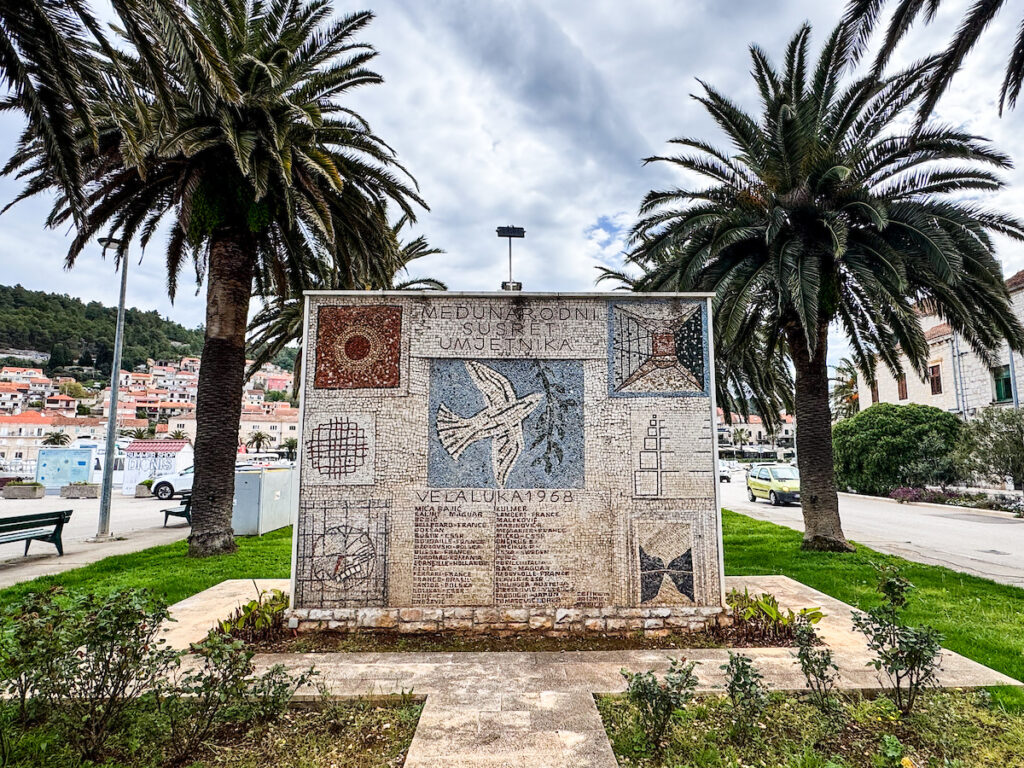
There’s a really cute place in Vela Luka where you can make your own mosaic with local artists so you leave something behind when you take your memories. The mosaics are running all throughout the sidewalks across town. It’s an homage to the olive terrace walls with little stones and is actually the longest mosaic in the world.
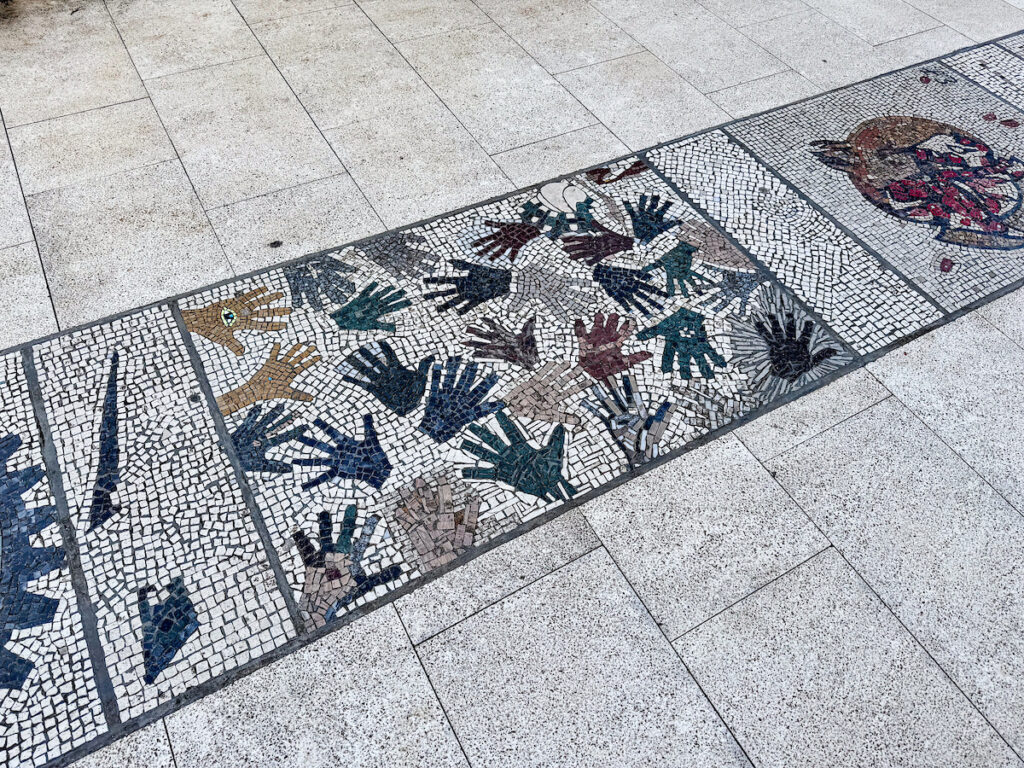
Dorjan Dragojevi, the director of the Vela Luka Tourist Bureau, took me on a tour to the Vela Spila, a historical cave about a 25 minute walk from the downtown area (or a 10 minute drive!). The cave is like 20,000 years old, and thought to be one of the oldest examples of clay workmanship in Europe.
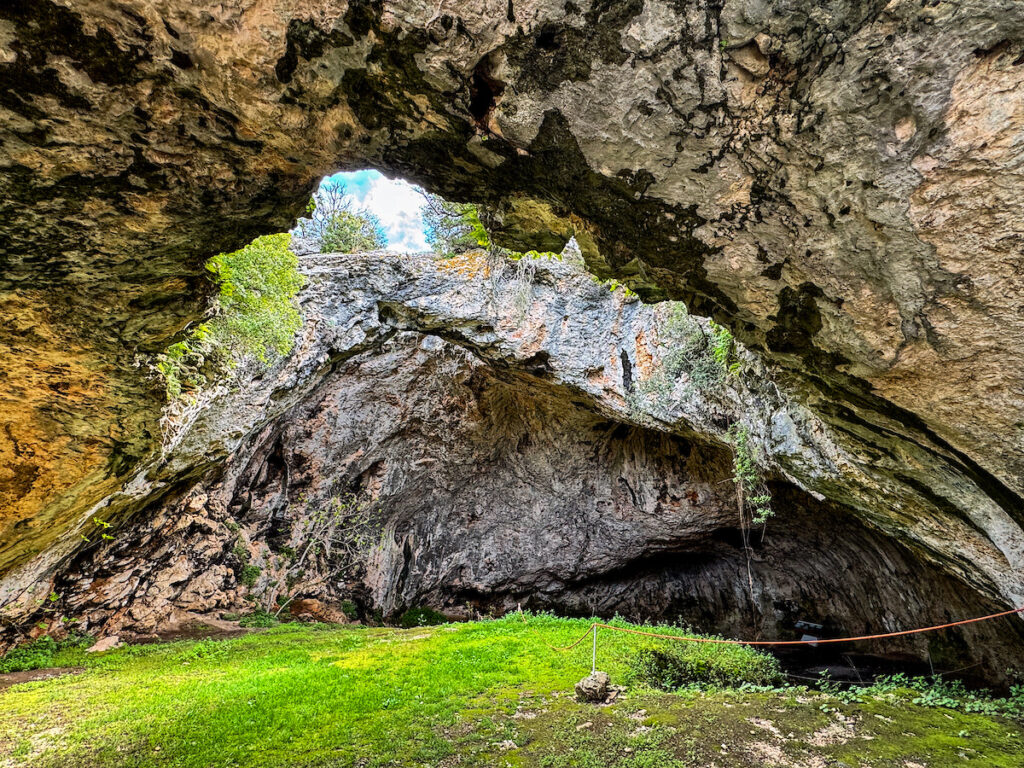
After the cave tour, we took a short walk and he pointed out that the walls are terraced for growing olive trees. Nearby the caves on the walking path is a breathtaking overlook of the entire city and island and should not be missed.
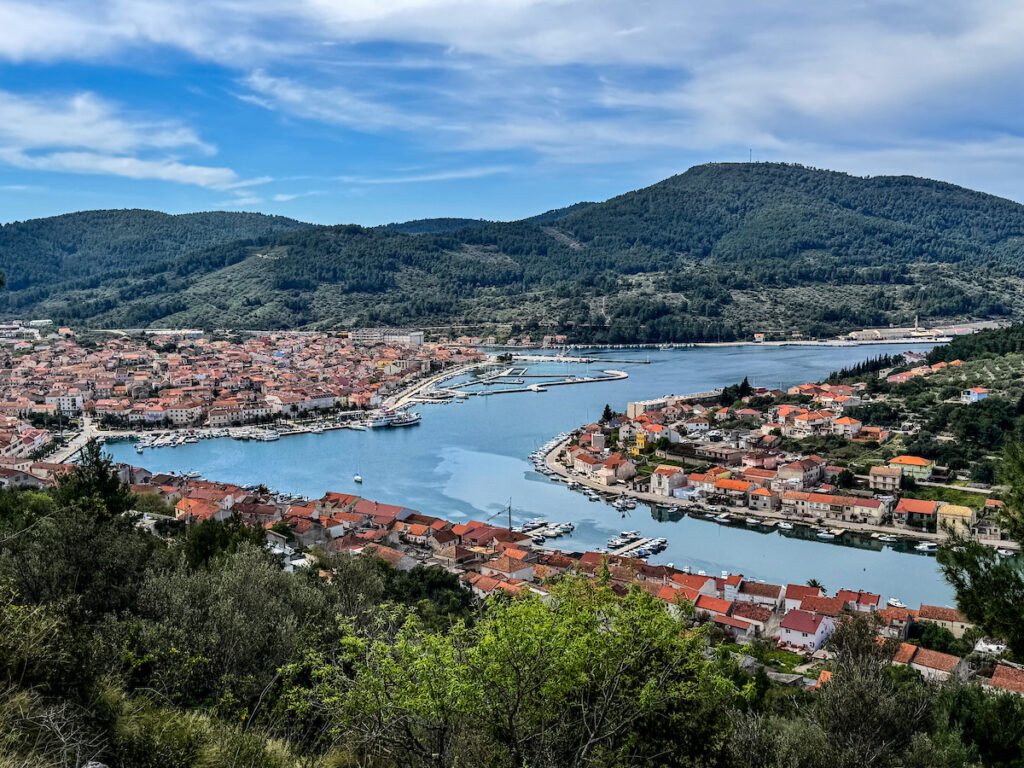
In the afternoon, I went to Blato city, where I went to an archeological museum, saw the working shipyard in the heart of the city center and tons of artifacts that they excavated from children’s burial sites.
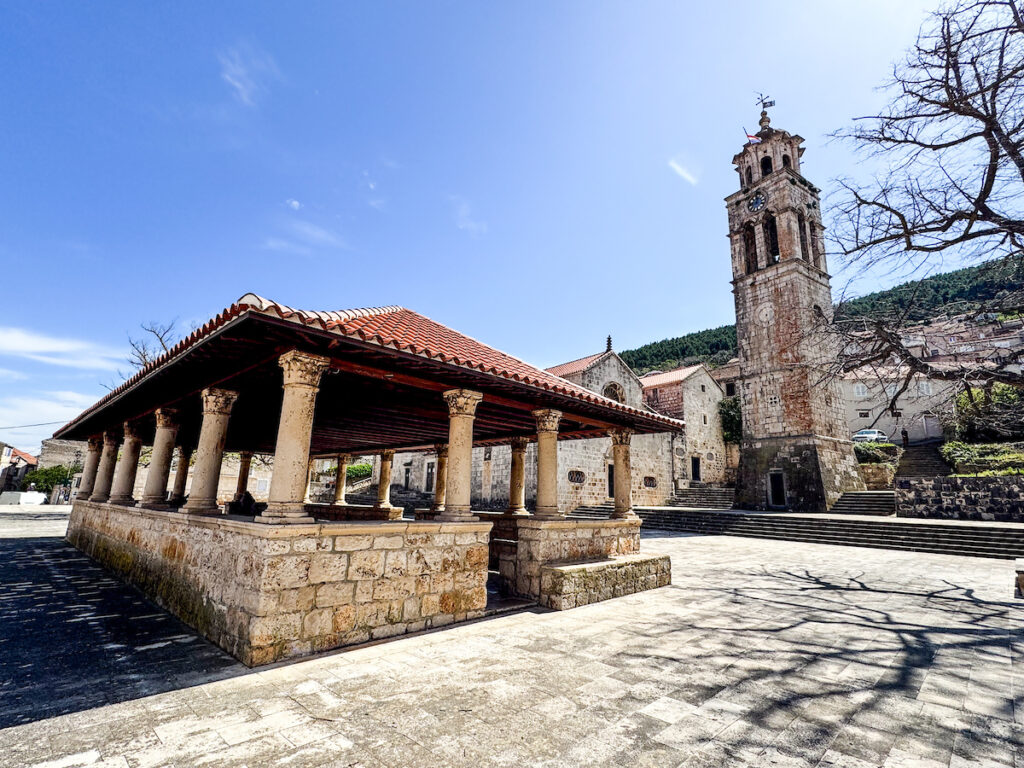
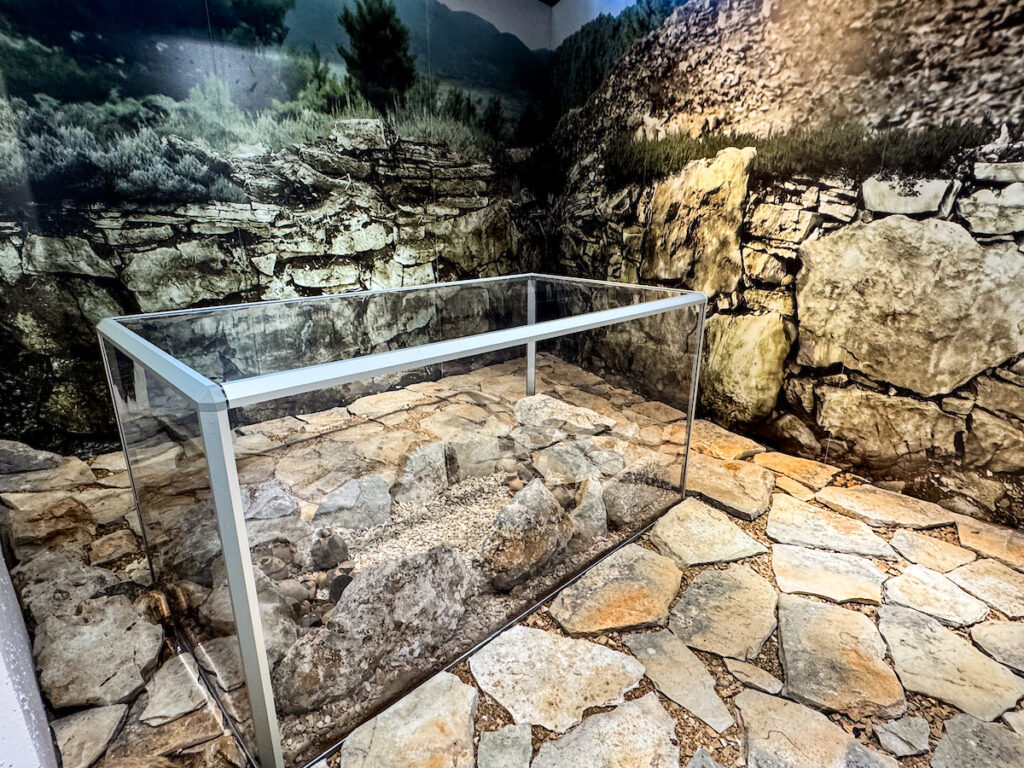
Most importantly, we went for a cake and wine tasting at OPG Protic Sanja, which is basically just this woman’s house where she hosts cooking classes and events with a focus on indigenous products and local recipes. This is the place I will be moving to. (Joking but seriously considering)
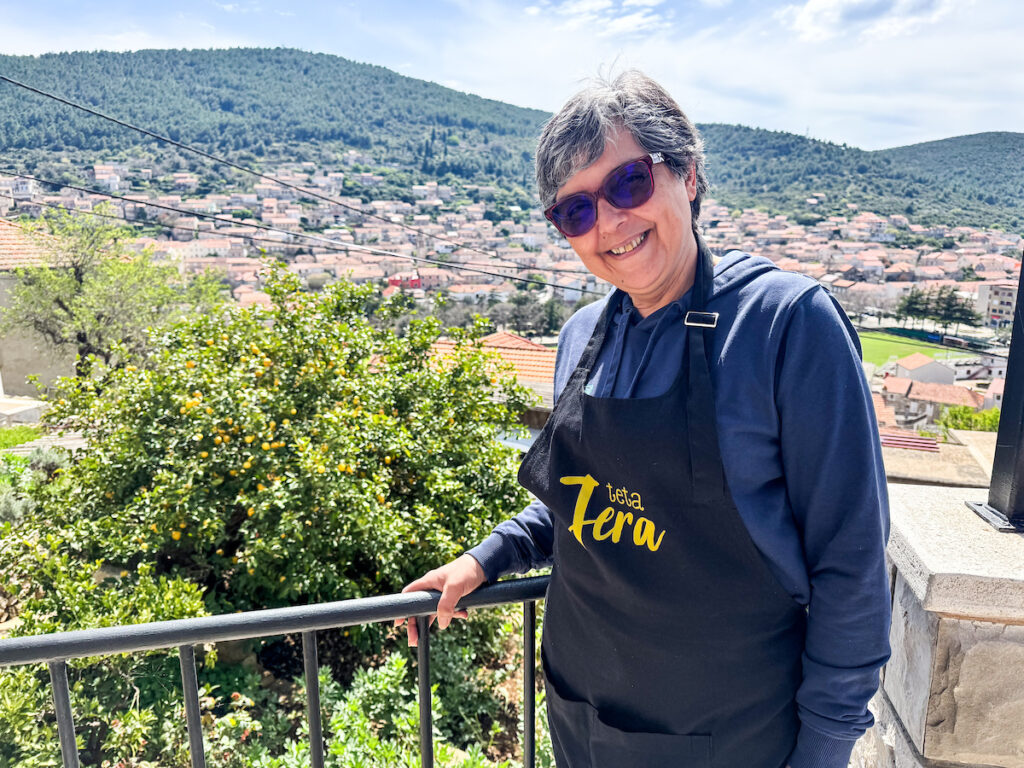
We had her beautiful handmade Lumblija, a special cake traditional to the island made with fruits and nuts and warm spices. The story behind the cake is that some 200 years ago, a French soldier and baker fell in love with a girl from Blato, and when he had to leave the island, he gave her a homemade cake and left with the words “ne m’oublie pas” or “do not forget me”. She did not speak French so that phrase eventually turned into “Lumblija”, and the cake got its name.
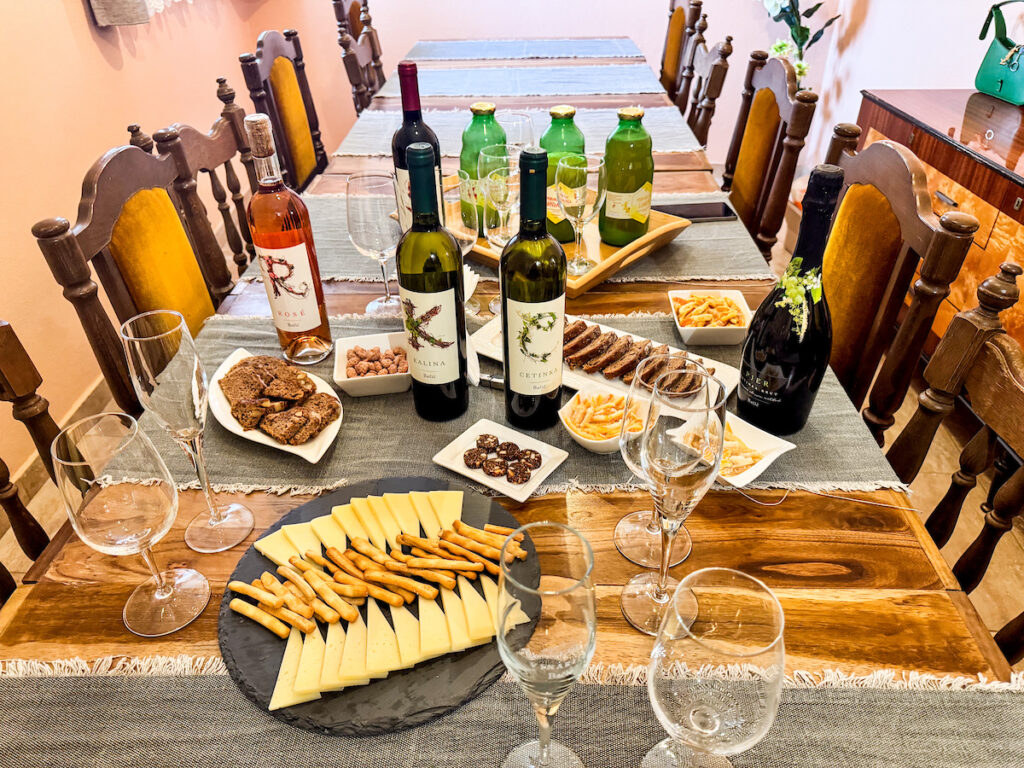
It was a delicious cake, so full of fruit and spices. We had it with sparkling wine made from the local grape Cetinka – sparkling and white.
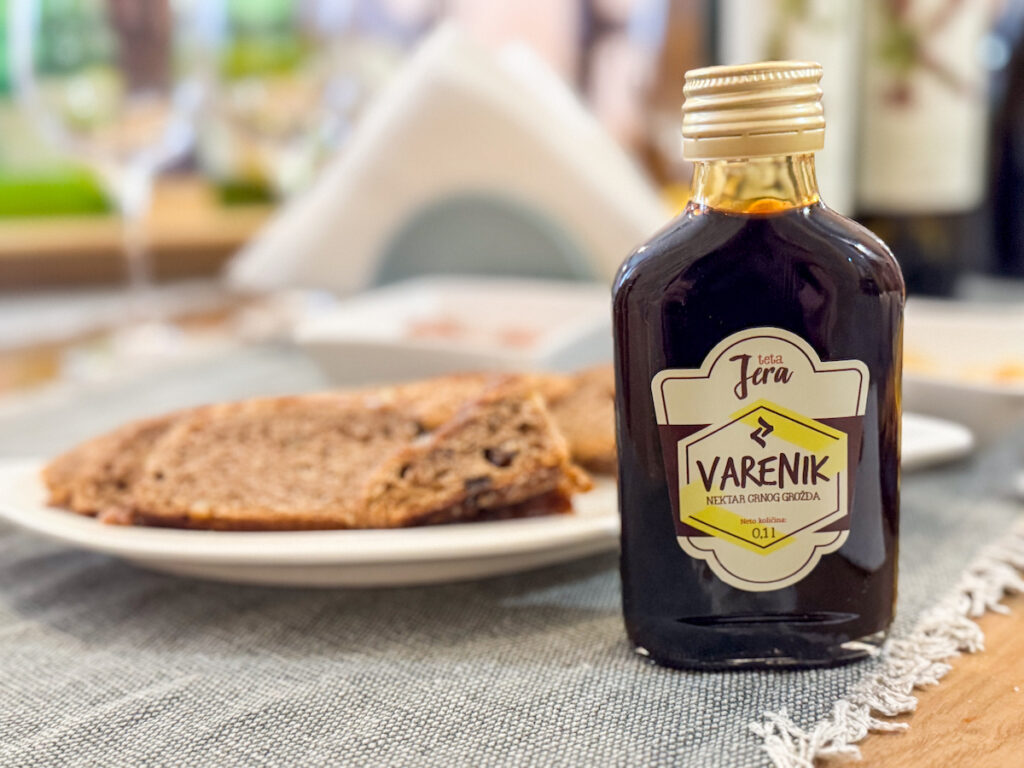
We had local cow cheese with candied mandarin, and beautiful candied lemon peels made from her own lemon tree. Everything paired beautifully with each wine, brought over by Mirna Petković, the wine representative for Bačić winery in Blato. The sweets were so delicious, the bites were all incredible, I had to be pulled out of here.
After Sanja’s home, we went to Black Island Winery, where we tried their Posip. My favorite wine was a 2023 rosé with a hot pink cork. I got one of the last bottles. So excited to drink it and remember this amazing day.
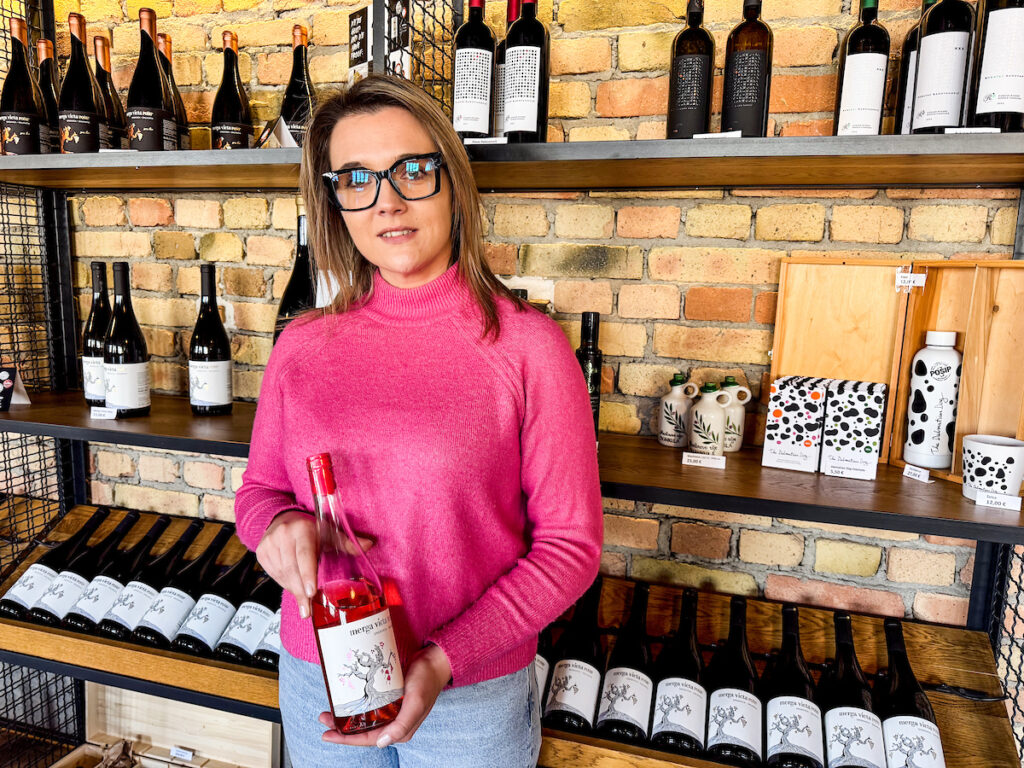
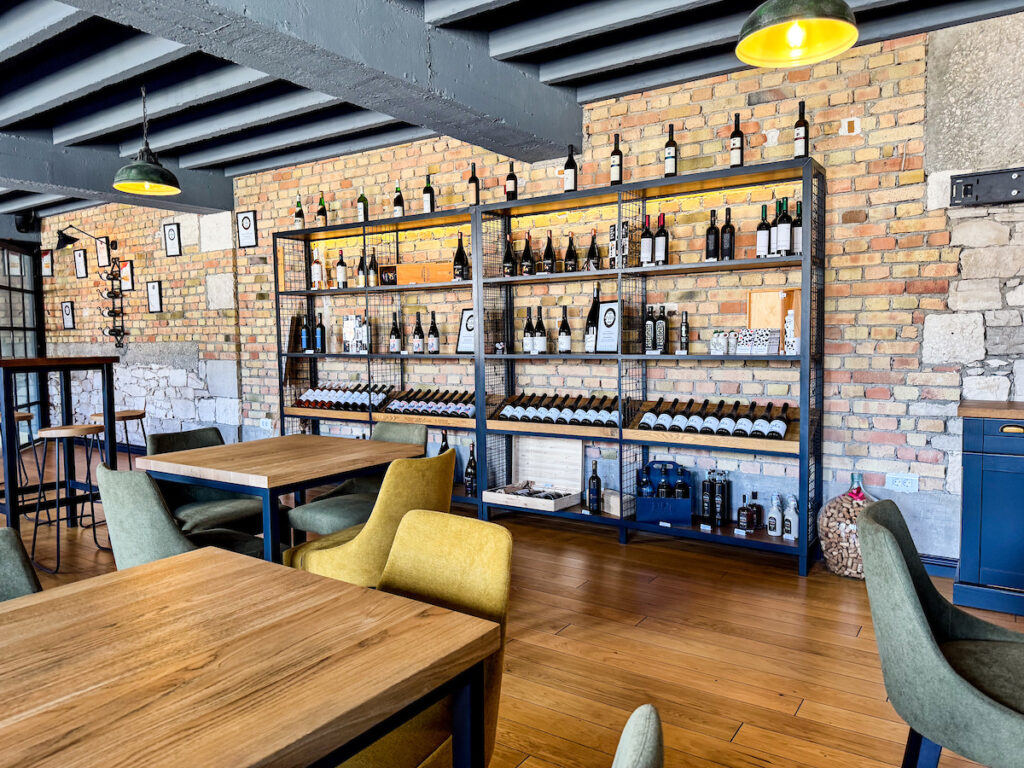
Day 7 – Korcula City Tour and Pasta Making (Thursday, April 3)
Another packed day of adventure and charm in Korcula City- Croatia seems to have a lot of amazing gastronomy and whimsical food adventures. Everything is very local and very integrated. Today I even went out of my comfort zone here & took a cooking class.
I started the day with a city tour. My guide was Lea Čumbelić, and I highly recommend learning about Korcula with her – she covered so much while being so fun to talk to. There are 25 streets, including the most famous Marco Polo street. Marco Polo has a bit of a funny history with Korcula.
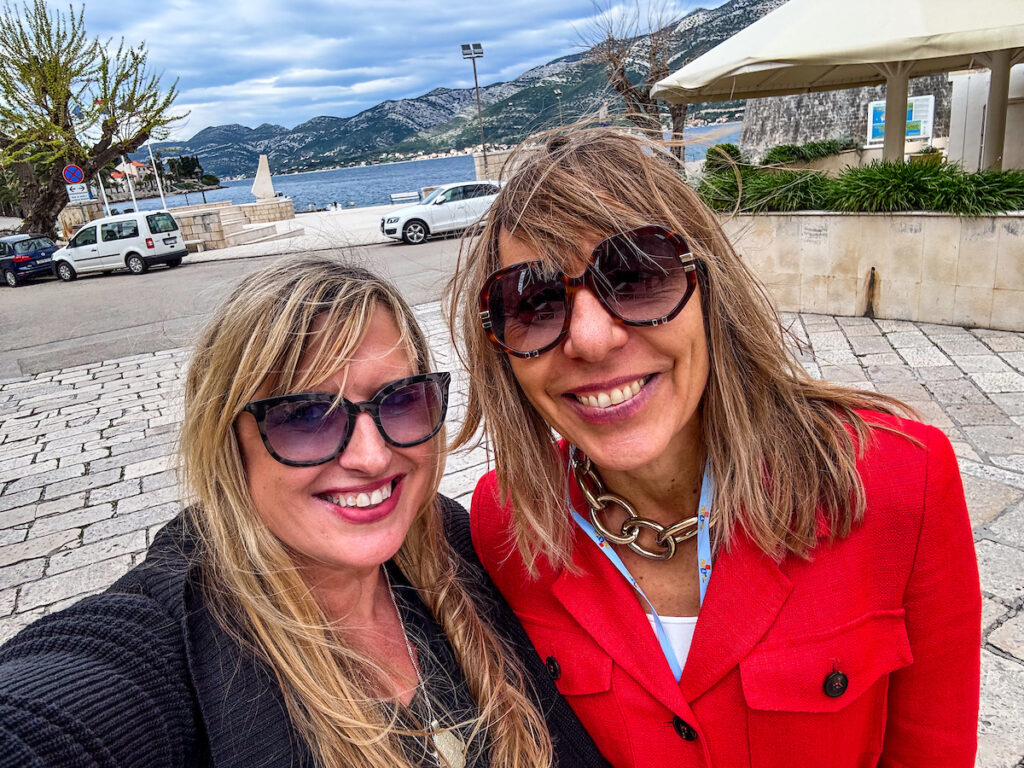
Korcula claims that Marco Polo was born there to a family of shipbuilders, and you can visit the house in which Korculans claim he was born. Most historians would disagree. Marco Polo is largely agreed to have been born in Venice, however the evidence is not definitive nor conclusive! We do know for sure that he lived on the island of Korcula.
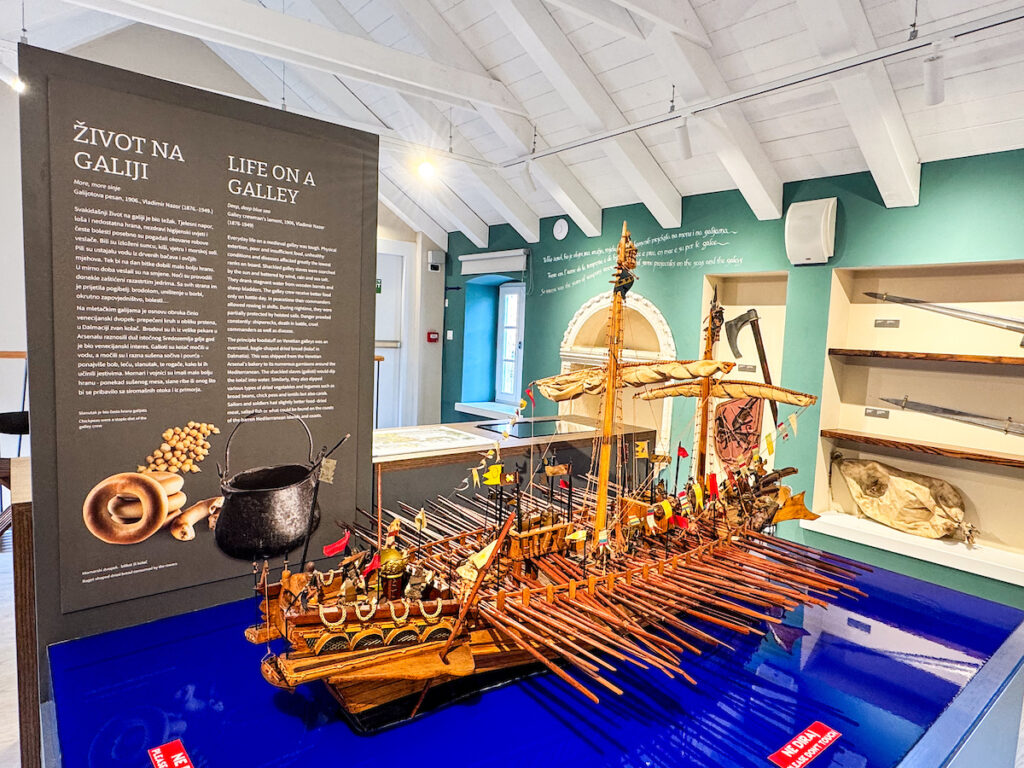
Originally there were two walls of fortification for the city of Korkula built in the 13th century – 9 towers still stand. In 1298, Marco Polo was captured by the Genoese and imprisoned in one of the towers for 11 months. You can climb to the top and see where he was held. This is agreed upon by both the people of Korcula and historians in general, as there is a first hand account from a fellow prisoner at that time.
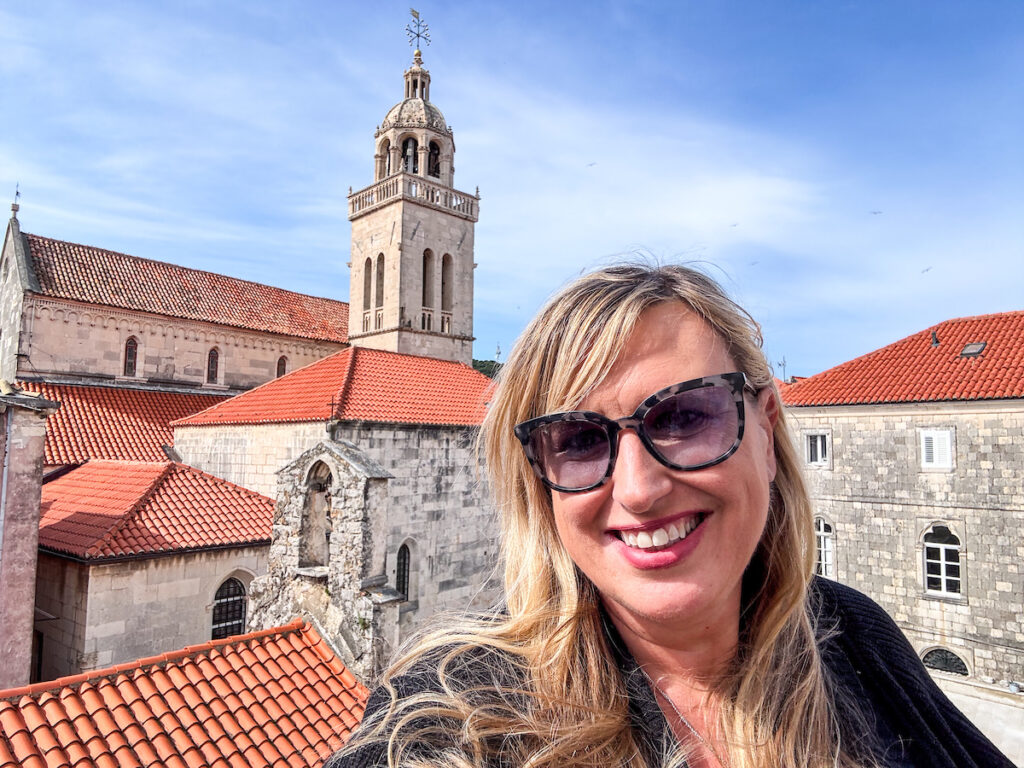
We also visited the beautiful St. Mark Cathedral, designed by Marko Andrijic. He was a stonemason from the 15th century, regarded as one of the best master builders and architects of that time. He was known for his exceptional stone cutting and redesigned the medieval fortifications of Korcula to more renaissance style and standards.
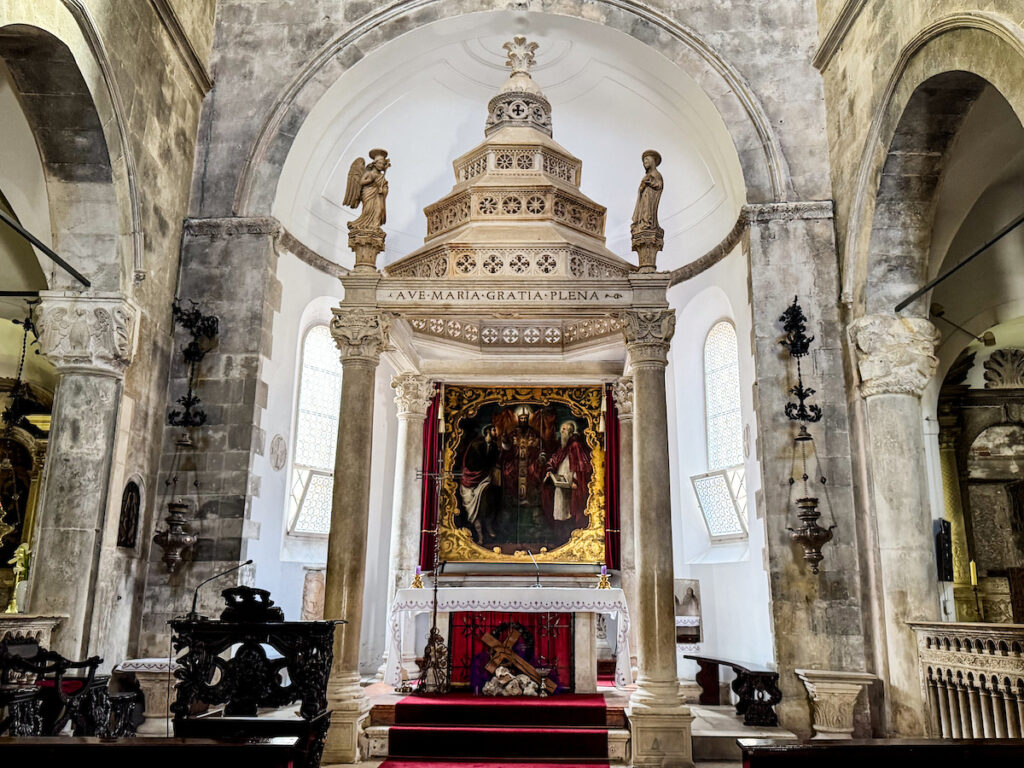
After the church, we visited the Korcula Town Museum, located in an old Venetian palace. In the basement, they have the most ancient pieces and as you go up, you learn about the history of the town. They have amphoras, paintings, maritime history, old tools and a really cool old camera.
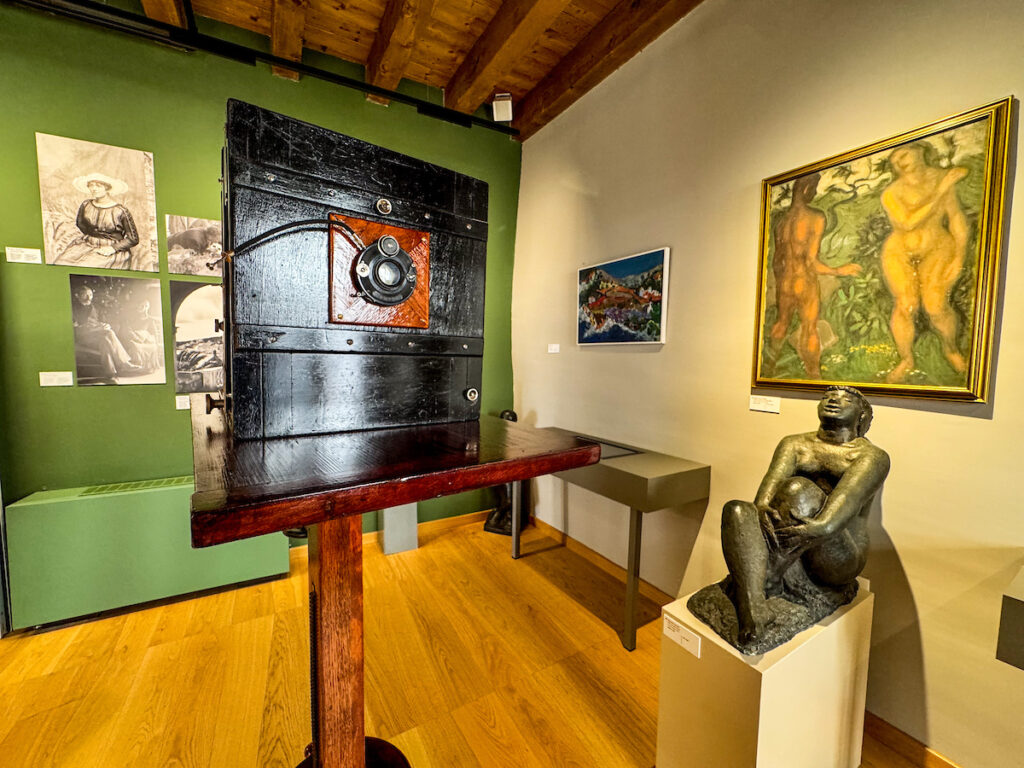
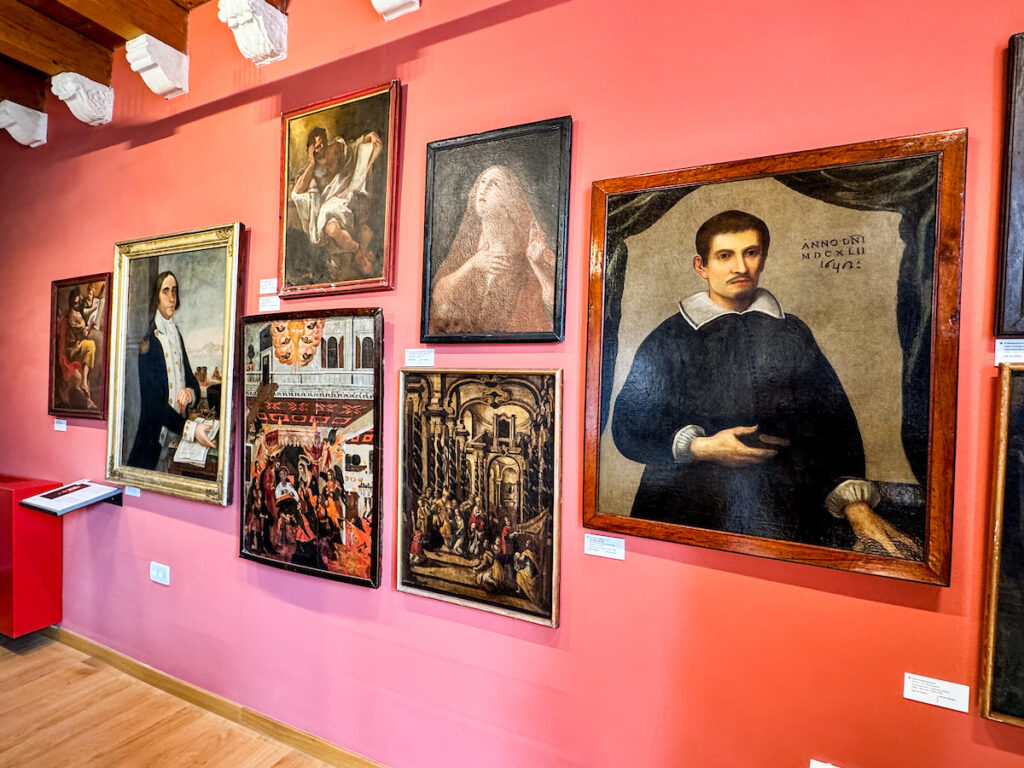
After the tour, I visited the town of Lombarda, a small fisherman’s village on the eastern end of the island, for some local culture and artisans. I learned about the Grk grape varietal, a white wine grape grown only here on the island of Korcula. It grows in the seemingly desolate sandy topsoil of Lombarda near the sea, and only 50,000 cases of it are produced each year.
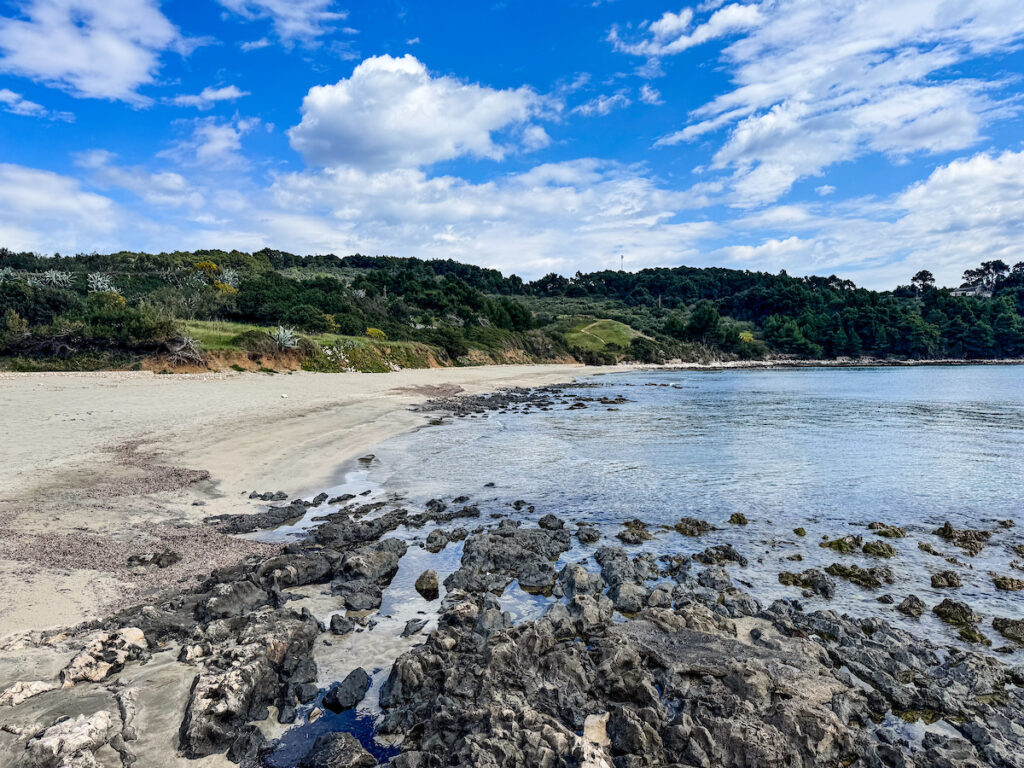
We stopped at Vlaho Kompareks’ honey bee farm. He’s got a big personality and gave a very fun talk about honey production (and olive oil & gin). There’s special honey food for adult bees and totally different pollen food for bee larvae. Who knew? He led a honey tasting, and I found out that I love honey made by bees who pollinate heather.
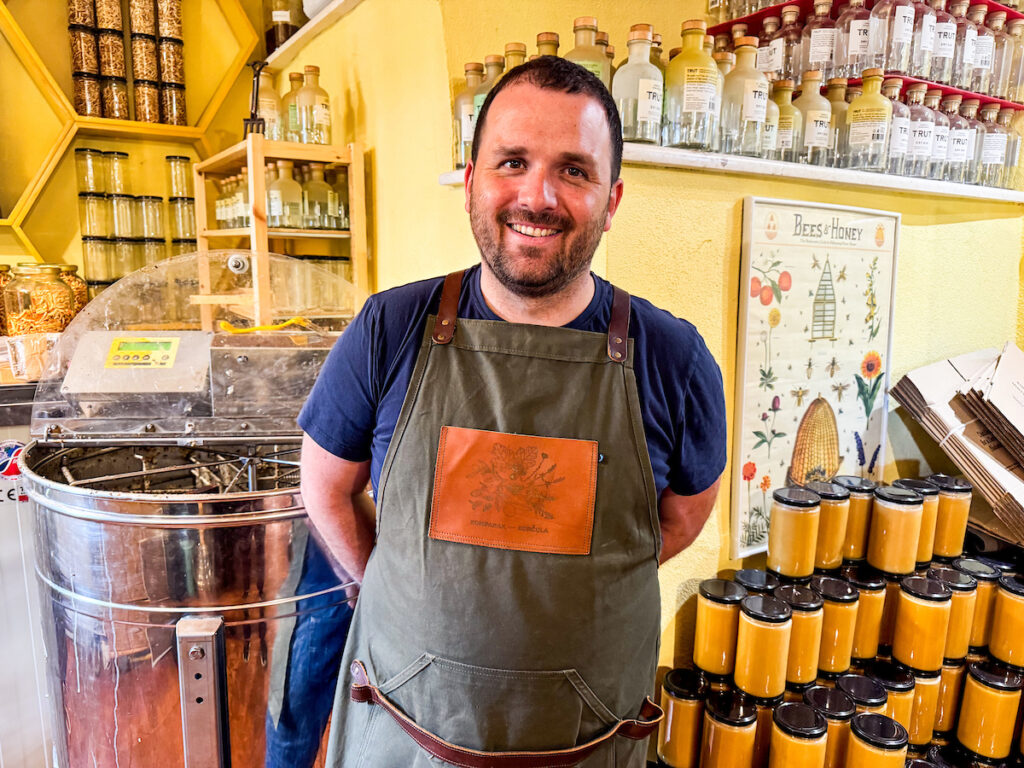
A very crafty guy, in 2020, he started making gin in his “factory under the sky” during the pandemic. What else was he supposed to do? His main herbal flavor for the TRUT gin is a bitter orange peel harvested on the island along with the traditional juniper berry.
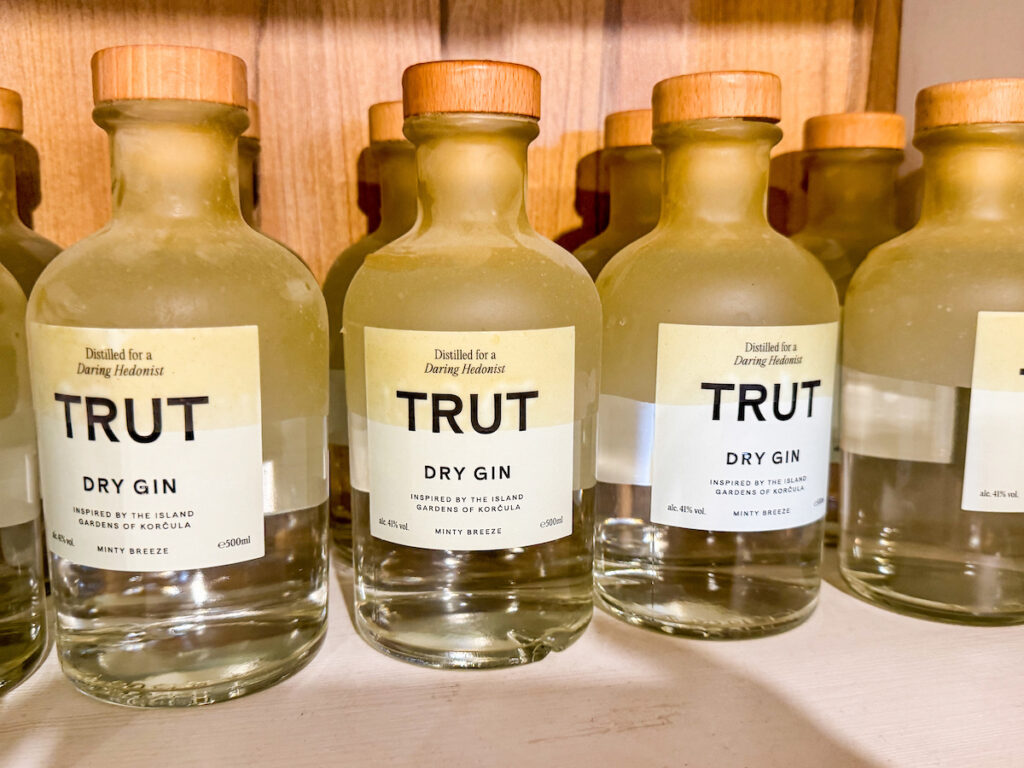
After leaving the honey bee farm, we headed to Škatula, a local bakery in Lombarda, for a pasta making cooking class. I have very little patience for cooking but I made Zrnovski makaruni, a traditional Korcula noodle dish. In the class, we learned how to make the dough, cut it to the correct size and roll the noodle dough around wooden dowels to make their unique shape.
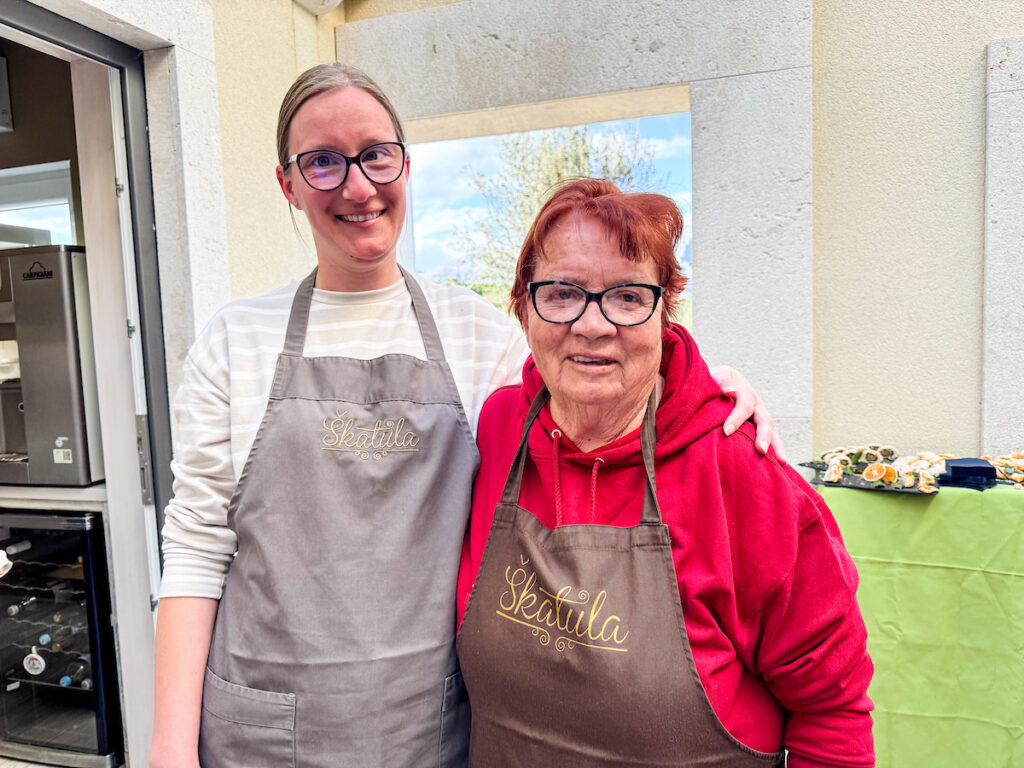
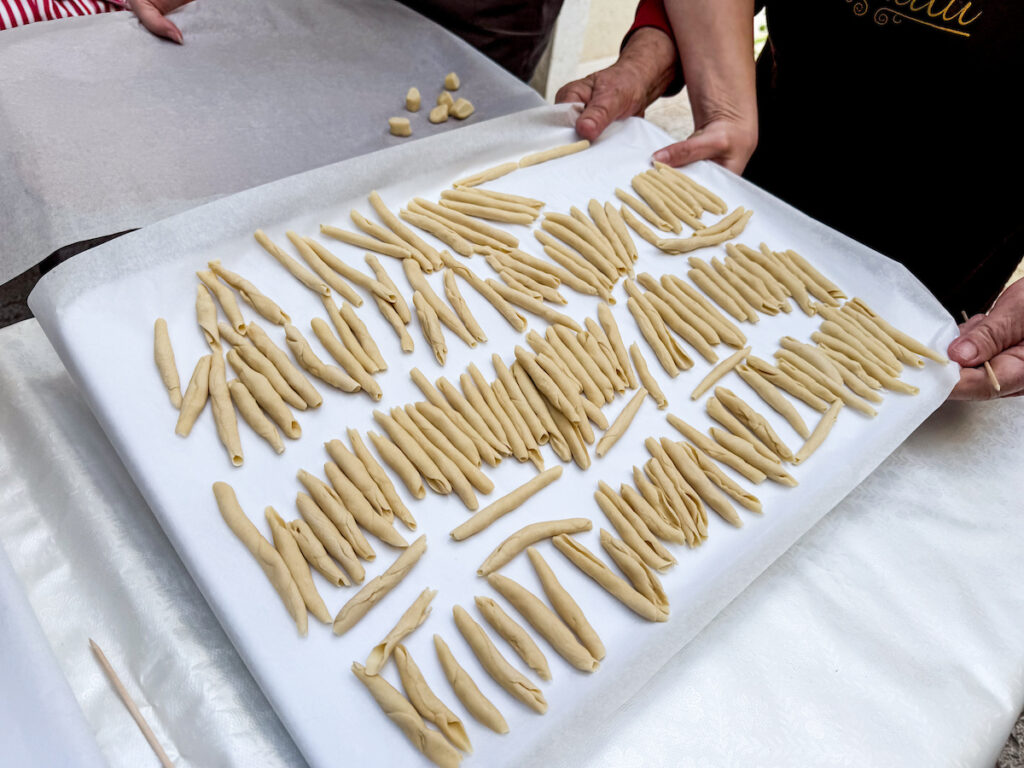
After the cooking class, we enjoyed wine tasting paired with our fresh pasta dishes for some much needed refreshment. We went to Casa Boschi and enjoyed a few different award winning Lombarda Grks, which was a super cool experience. Such a special grape – grown only here, with the sea on 3 sides, struggling through the sandy topsoil. There’s a slight bitterness at the end of each sip, which is very interesting.
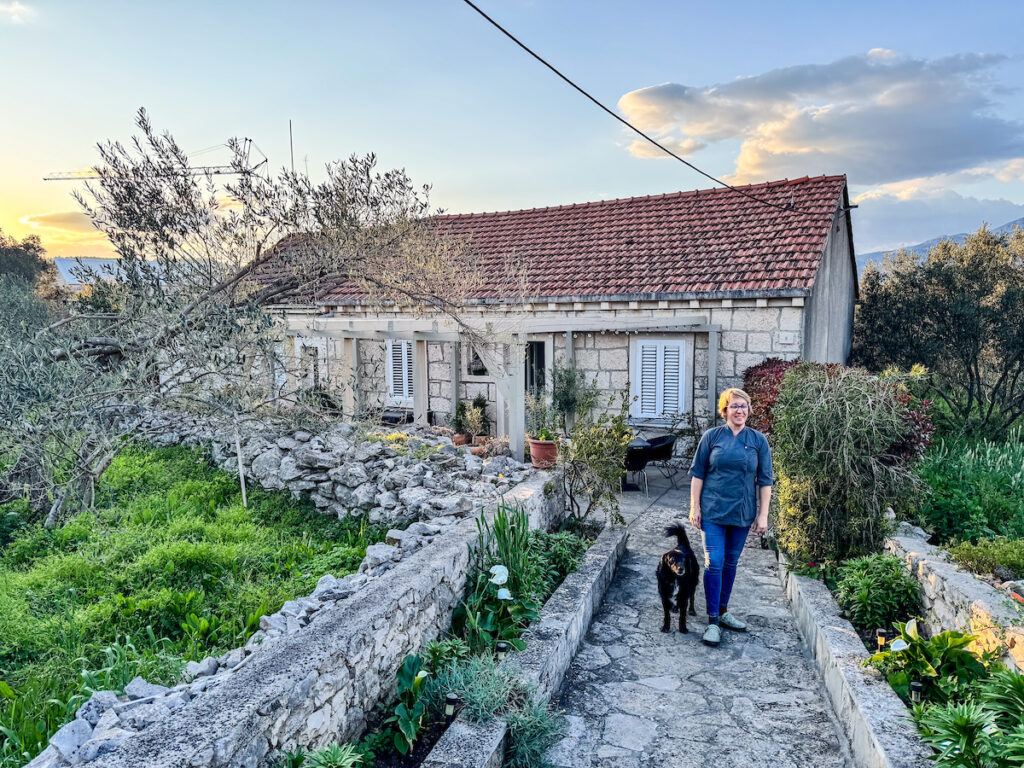
Korčula captured my heart in the most unexpected ways—through its sun-drenched stone streets, stories passed down through centuries, and flavors I won’t soon forget. From spontaneous ferry rides to heartfelt meals in locals’ homes, every moment felt like an invitation to slow down and savor the island’s rich culture. Whether I was making pasta by hand, sipping Grk by the sea, or standing in a cave older than history itself, Korčula offered a beautiful balance of connection, discovery, and indulgence. As I packed up my bags and took one last look at the shimmering coastline, I knew this chapter of my Croatian adventure would stay with me long after the journey ends.
Stay tuned for our adventures in Hvar!

